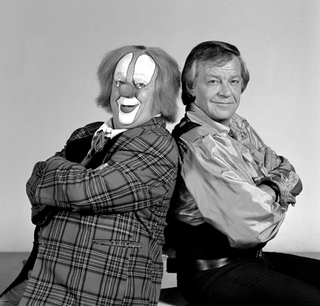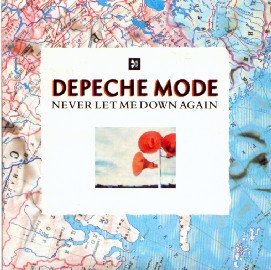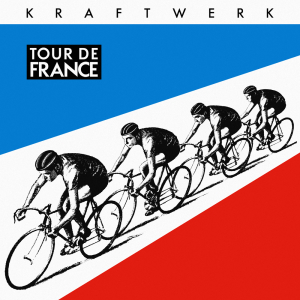Related Research Articles

Bassie & Adriaan was a television program series focusing on the adventures and lives of a circus duo consisting of clown Bassie and acrobat Adriaan, played by real-life circus duo Bas and Aad van Toor.

The SPARS code is a three-position alphabetic classification system developed in the early 1980s by the Society of Professional Audio Recording Services (SPARS) for commercial compact disc releases to denote aspects of the sound recording and reproduction process, distinguishing between the use of analog equipment and digital equipment. The code's three positions refer to recording, mixing, and mastering respectively. The first two positions may be coded either "A" for analog or "D" for digital; the third position (mastering) is always "D" on digital CDs. The scheme was not originally intended to be limited to use on digital packaged media: it was also available for use in conjunction with analog releases such as vinyl or cassette, but this was seldom done in practice.
The Doctor Who theme music is a piece of music written by Australian composer Ron Grainer and realised by Delia Derbyshire at the BBC Radiophonic Workshop. Created in 1963, it was the first electronic music signature tune for television. It is used as the theme for the science fiction programme Doctor Who, and has been adapted and covered many times.

A maxi single, or maxi-single, is a music single release with more than the usual two tracks of an A-side song and a B-side song.

"Never Let Me Down Again" is a song by the English electronic music band Depeche Mode. It was released as the second single from their sixth studio album, Music for the Masses (1987), on 24 August 1987. It reached No. 22 in the UK, No. 2 in West Germany, and the top-10 in several other European countries such as Sweden and Switzerland, topping the Danish charts. In the US, it entered the Billboard Hot 100. The cover art features fragments of a Soviet map of Russia and Europe, with different fragments used for the different editions of the single.

"Tour de France" is a song by German electronic band Kraftwerk. It was first issued in early August 1983, peaking at number 22 in the United Kingdom singles chart on 6 August.
The "Theme from Star Trek" is an instrumental musical piece composed by Alexander Courage for Star Trek, the science fiction television series created by Gene Roddenberry that originally aired between September 8, 1966, and June 3, 1969.

The Pink Panther Show is a showcase of animated shorts produced by David H. DePatie and Friz Freleng between 1969 and 1978, starring the animated Pink Panther character from the opening credits of the live-action films. The series was produced by Mirisch Films and DePatie–Freleng Enterprises, and was broadcast Saturday mornings on two American television networks: from September 6, 1969, to September 2, 1978, on NBC; and from September 9, 1978, to September 1, 1979, on ABC.
"Hallo Spaceboy" is a song by the English musician David Bowie from his 20th studio album, Outside (1995). It originated as an instrumental by Reeves Gabrels called "Moondust", which Bowie and Brian Eno stripped down and used to form the final track. An industrial rock and electronica number influenced by the Pixies and Nine Inch Nails, the song contains a hypnotic sound, with synthesisers, loops and distorted guitar lines. Lyrically influenced by Brion Gysin, the song contains images of apocalypse and continues the androgynous conundrums of former Bowie songs such as "Rebel Rebel".
Kanon is a visual novel developed by Key and published by VisualArt's in 1999. The story follows Yuichi Aizawa, who has returned to the town where seven years ago he would spend his school vacations, but has forgotten many of the details regarding his previous visits. Over the course of the series, Yuichi slowly regains these memories as he meets new friends and is reacquainted with others from his past. It was adapted by Toei Animation into a 13-episode anime television series broadcast in 2002 along with an accompanying original video animation episode released in 2003, both directed by Takamichi Itō with music direction by Hiroyuki Kōzu. Kyoto Animation also adapted it into a 24-episode anime television series broadcast between 2006 and 2007 directed by Tatsuya Ishihara with music direction by Shinji Orito. The discography of Kanon and its anime adaptations consists of one compilation album, three singles, three soundtracks, and three remix albums.

King of Sweet is a compilation album by His Name Is Alive, originally released in a limited run by the Perdition Plastics label in 1993. Most, if not all, of the songs had previously appeared on the band's many self-released cassettes in the late 1980s and early 1990s, and some of them had appeared in different versions on the band's 4AD releases.
Kamen Rider Den-O is the seventeenth installment in the popular Kamen Rider Series of tokusatsu programs. As part of the series, several musical releases through Avex Mode were made for the series opening themes, ending themes, image songs, and original soundtracks. Most songs are rearrangements of the initial opening and ending themes.
"Moonlighting" is the theme song to the ABC comedy-crime drama of the same name, which ran from 1985 to 1989 and starred Bruce Willis and Cybill Shepherd. The theme song was performed by Al Jarreau, who wrote the song with Lee Holdridge. Jarreau recorded two complete recordings of the song, both of which were used for the series.

Connie Talbot's Holiday Magic, also known as Connie Talbot's Christmas Magic, is the third album by British child singer Connie Talbot. Released 13 October 2009 by AAO Music, it features rerecordings of songs from Talbot's previous album, Connie Talbot's Christmas Album, as well as new tracks. The album was released after Talbot was named child ambassador for the Toys for Tots Campaign, and some of the proceeds from the album were given to the organisation. The album was marketed with a tour of the United States, a cross-marketing campaign with Boscov's, and a television special produced by WVIA, a DVD of which was later released for sale. Reviews of the album were mixed; while Talbot was called "sweet" and her range was praised, other reviewers considered the album to be "cloying" and "little more than a novelty act".

Talk to Me is the first English language album by Brazilian recording artist Xuxa. The album is a compilation of Xuxa's most popular songs in English versions for her TV show - Xuxa - but the material was never released commercially neither in America, nor in Brazil.

AKB48 Show! is a TV variety show produced by NHK in Japan, and aired weekly on BS Premium and NHK World Premium from October 5, 2013, to March 24, 2019. The show featured songs, comedy skits and short dramas performed by AKB48 and sister groups.

Zard Forever Best: 25th Anniversary is the fourth compilation album by Japanese pop band Zard. It was released on 10 February 2016 under B-Gram Records.

Beautiful Life: The Singles is a commemorative box set by the Swedish pop group Ace of Base. The 26-CD box set contains every commercial and promotional CD single released from the group's first four studio albums, Happy Nation / The Sign (1992/1993), The Bridge (1995), Flowers / Cruel Summer (1998), and Da Capo (2002). Each disc comes with previously unreleased material, including brand new remixes commissioned specifically for the release. It was released under the label Edsel by the Demon Music Group on 28 April 2023 in the UK.
References
- ↑ http://www.beeldengeluidwiki.nl/ Beeld en Geluid
- ↑ http://www.adriaan-homepage.nl/ Official site